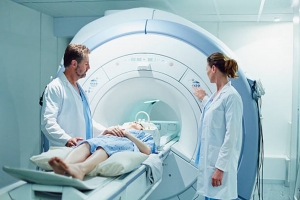Approval Granted for Cambridge Cancer Research Hospital
Plans for a new cancer research hospital on the Cambridge Biomedical Campus have been green lit by local councillors, paving the way for construction to potentially begin next year. Despite initial reservations due to the area's ongoing water scarcity, the project has received approval following assurances that environmental impacts, especially concerning water usage, would be minimised.
The Environment Agency had raised concerns about the strain this development might place on the already limited potable water supplies, suggesting possible detrimental effects on local water bodies. However, it was acknowledged in the planning report that the hospital would utilise water more efficiently than current local cancer treatment facilities and would incorporate rigorous infection control practices.
Designed to house 77 patient rooms, the seven-story building aims to integrate clinical and research functions, facilitating closer collaboration between doctors and researchers. This setup is expected to enhance patient care and expedite advancements in cancer treatment.
Looking ahead, the hospital is expected to begin its construction phase by the end of next year and is scheduled to open its doors in 2029. This development is seen as a critical step not only in advancing cancer research but also in ensuring the future health and well-being of the community.
Lawmakers Support Cigarette Purchase Ban for Individuals Born After 2009
UK lawmakers have endorsed a proposal to prohibit anyone born after 2009 from purchasing cigarettes, moving the plan closer to becoming law. The initiative, led by Prime Minister Rishi Sunak, passed the House of Commons with 383 votes in favour and 67 against, despite resistance from some prominent Conservative members, including former Prime Ministers.
Health Secretary Victoria Atkins defended the bill in parliament, arguing that addiction undermines personal freedom. The Tobacco and Vapes Bill aims to create stringent smoking regulations in the UK, influenced by similar legislation previously introduced in New Zealand.
During the debate, Atkins described the government’s vision of a "smoke-free generation." Nonetheless, the proposal faced criticism from several Conservative MPs, including former Prime Minister Liz Truss, who argued that the measure infringes on personal liberties. Boris Johnson also criticised the initiative during a speech in Canada, calling it "absolutely nuts" and a deviation from traditional Conservative values.
Despite these objections, the bill received broad support due to a free vote permitted by the Conservatives, with Labour’s backing ensuring its passage. The bill must still clear several hurdles, including the House of Lords, before it can become law, potentially ahead of the 2024 general election.
Surrey Ambulance Workers to Strike Over Wage Dispute, According to Union
Ambulance staff from the GMB Union at the Epsom and St Helier NHS Trust have overwhelmingly voted to take industrial action over unresolved pay disputes. A significant 94% of voters favoured the strike, with a turnout of nearly 80% voting participants. The most important part of the dispute centres on unpaid back wages related to the London Living Wage, with the union stating that members are owed up to £1,300 each.
In response, an NHS Trust spokesperson assured that all employees are now receiving the London Living Wage as of this month. However, this assurance has not fully addressed the underlying issue of backpay.
GMB Regional Organiser Helen O’Connor stressed the vital role all Ambulance staff play in healthcare, particularly in transporting patients to critical treatments. She expressed regret over the necessity of a strike, attributing it to the trust's failure to settle the wage discrepancies. "Striking is the last resort for our committed members," she explained.
No specific dates for the strike have been set yet, but O’Connor warned that any industrial action could significantly disrupt patient services. The potential strike underscores ongoing challenges in the healthcare sector regarding fair wages and timely payments, which are crucial for maintaining staff welfare and high-quality patient care.
Blood Markers in Long Covid May Lead to Future Clinical Trials
A recent UK study has revealed that individuals with Long Covid may have ongoing inflammation in their bloodstream, shedding light on the nature of the condition and potential treatment approaches. Researchers have identified specific proteins that increase the risk of symptoms such as fatigue, especially in those who were hospitalised due to severe Covid infection.
Long Covid, defined as symptoms persisting for at least 12 weeks following a Covid infection, is believed to have impacted millions globally. Common symptoms include severe fatigue, shortness of breath, and cognitive issues like memory problems, often referred to as "brain fog." Other symptoms may include insomnia, loss of smell, and anxiety. Interestingly, the likelihood of developing long-term symptoms doesn't necessarily correlate with the severity of the initial infection.
Imperial College London conducted the largest study on Long Covid in the UK, tracking 659 hospital patients with severe cases of the virus. Six months post-infection, 426 participants reported ongoing symptoms, while 233 had fully recovered. Those still experiencing symptoms showed active and continuous patterns of inflammatory proteins in their blood, indicating an unusual response long after the initial infection.
The UK Department of Health and Social Care has supported the study as part of a broader initiative, investing over £50 million in research to better understand and find new treatments for Long Covid, recognising its significant impact on individuals' physical and mental health.
Consultants Resolve Salary Negotiations with English Government
In England, Senior Medical Specialists have resolved their pay dispute with the government, accepting a new agreement that offers up to a 20% salary increase for the 2023-24 fiscal year. This resolution follows four strikes but does not include junior doctors, who are still in negotiations. The British Medical Association (BMA) and the Hospital Consultants and Specialists Association (HCSA) reported that 83% of members approved the recent offer, an improvement on a previously rejected proposal.
The agreement secures a backdated pay increase of 2.85% for consultants at the beginning of their careers, with expectations of further raises in the upcoming fiscal year, alongside a promise to reevaluate payment frameworks in depth.
Dr. Vishal Sharma from the British Medical Association (BMA) underscored the crucial role that both negotiation and industrial action played in finalising the deal, aiming to improve patient care and reduce the backlog of waiting lists.
While this agreement is a step forward for consultants, junior doctors' demand for a 35% pay raise is still outstanding, with a continued mandate for strikes. Unresolved disputes also persist in Wales and Northern Ireland, with junior doctors having taken action and consultants potentially following suit.
NHS Community Health Diagnostics Centre to Launch in Bristol
A new groundbreaking health facility, scheduled to open in April at Cribbs Causeway, is set to significantly enhance diagnostic services in the area, offering up to 45,000 tests yearly. This venture is a collaboration between the North Bristol NHS Trust and InHealth, aimed at easing local health system pressures. The Community Diagnostic Centre (CDC) will initially operate from mobile units, with plans to transition to a permanent site within the year.
Equipped to conduct a wide array of diagnostics, including endoscopy and various imaging scans, the CDC aims to streamline patient care by reducing wait times for diagnosis and treatment, a priority underscored by Dr. Joanne Medhurst of the NHS Bristol, North Somerset, and South Gloucestershire Integrated Care Board. A similar Community Diagnostic Centre is planned for Weston-Super-Mare. Geoff Searle of InHealth highlighted the network's success in enhancing patient outcomes.
This initiative is part of a government strategy to open about 160 CDCs by 2025, aiming to transform diagnostic services nationwide. By improving diagnostic access, the project seeks to expedite treatments, enhance patient outcomes, and streamline healthcare delivery, marking a critical advancement in national healthcare infrastructure.








